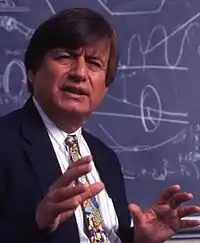Richard A. Tapia
Richard Alfred Tapia (born March 25, 1938) is an American mathematician and University Professor at Rice University in Houston, Texas, the university's highest academic title.[1][2] In 2011, President Obama awarded Tapia the National Medal of Science.[3] He is currently the Maxfield and Oshman Professor of Engineering; Associate Director of Graduate Studies, Office of Research and Graduate Studies; and Director of the Center for Excellence and Equity in Education at Rice University.[4]
Richard A. Tapia | |
|---|---|
 | |
| Born | March 25, 1938 |
| Nationality | American |
| Alma mater | University of California, Los Angeles (B.A., M.A., Ph.D.) |
| Known for | Mathematical optimization |
| Awards | Presidential Award for Excellence in Science, Mathematics, and Engineering Mentoring, National Medal of Science |
| Scientific career | |
| Fields | Mathematics |
| Institutions | Rice University |
| Thesis | A Generalization of Newton's Method with an Application to the Euler-Lagrange Equation |
| Doctoral advisor | Magnus Hestenes Charles Brown Tompkins |
| Doctoral students | Jorge Nocedal |
Tapia's mathematical research is focused on mathematical optimization and iterative methods for nonlinear problems. His current research is in the area of algorithms for constrained optimization and interior point methods for linear and nonlinear programming.
Biography
Tapia was born in Santa Monica, California to parents, Amado and Magda, who both emigrated to the United States from Mexico.[5] His father worked for Japanese American horticulturists in southern California.[6]
He married Jean Tapia,[7] a Newyorrican (daughter of Puerto Rican who grew up in New York) and had 2 children: Circee and Richard [8]
Education
He received his B.A. in mathematics from the University of California, Los Angeles, in 1961.
He then earned his M.A. in mathematics, also from the University of California, Los Angeles, in 1966.
He received his Ph.D. from University of California, Los Angeles, 1967 in mathematics with the dissertation: "A Generalization of Newton's Method with an Application to the Euler–Lagrange Equation"[9] under the advisors: Magnus Hestenes, Charles Tompkins[10]
Tapia also holds honorary doctorates from Carnegie Mellon University and the Colorado School of Mines.[11]
Career
In 2004, he received the Society for Industrial and Applied Mathematics (SIAM) Prize for Distinguished Service to the Profession, in Portland, and Distinguished Public Service Award, American Mathematical Society, in Phoenix.[12]
In 2009, he received Hispanic Heritage Award in Math and Science and he was chosen to have a "Celebration of Diversity in Computing" [conference][13] named after him (usually held annually or biennially[14]).[15]
In 2014, the Blackwell-Tapia prize and conference were named for Tapia and David Blackwell.
In 2021, he received the award Fellow of the American Mathematical Society.[16]
See also
- Army Mathematics Research Center at. the University of Wisconsin–Madison
- Baylor College of Medicine
- National Science Foundation
- National Science Board by President Clinton
- National Academy of Engineering
- SACNAS Scientist Award, Society for the Advancement of Hispanics/Chicanos and Native Americans in Science
- T.I.R.R., (then called the Texas Institute for Rehabilitation and Research) Baylor College of Medicine
- Vannevar Bush Award
References
- "Award #0634516 — Empowering Leadership: Computing Scholars of Tomorrow". National Science Foundation. March 1, 2007. Retrieved 2009-06-06. Tapia is the Principal investigator on a $2 million NSF grant (2007-2010) addressing networking for a "minority student or faculty at a majority institution".
- "Tapia promoted to University Professor: Hispanic pioneer earns university's top academic title" (Press release). Rice University. October 14, 2005.
- "Twelve Researchers Take Home Top Medals". Science Insider. September 28, 2011. Archived from the original on October 1, 2011. Retrieved September 28, 2011.
- "Richard A. Tapia — Brief Bio". Department of Computational and Applied Mathematics, Rice University.
- "Richard Tapia - Biography". Maths History. Retrieved 5 March 2022.
- Hispanic Engineer & IT. Career Communications Group. 2010. Retrieved 7 March 2022.
- Jean Tapia's 60th Birthday Celebration. 2001. Retrieved 12 September 2023.
- Loosing the Precious Few. ARTE PUBLICO Press. 2022. Retrieved 12 September 2023.
- Megginson, Robert E. (December 8, 2002). "Arlie Petters Is First Recipient of Blackwell-Tapia Prize". SIAM News. Society for Industrial and Applied Mathematics. Retrieved November 15, 2008.
- "Richard Tapia". Mathematics Genealogy Project. Retrieved November 15, 2008.
- Newton, David E. (14 May 2014). Latinos in Science, Math, and Professions. Infobase Publishing. ISBN 978-1-4381-0786-8.
- "Societies: The SIAM Prize for Distinguished Service". The MacTutor History of Mathematics. University of St. Andrews.
- See the older [2009] version of << "Archives of Previous Tapia Celebration Websites". Archived from the original on March 27, 2009. Retrieved July 12, 2009. >> ... (which might contain some info that is more complete than [or otherwise different from] newer versions of the ["archive" listing of] << "Previous Tapia Conferences". Archived from the original on October 8, 2018. Retrieved June 12, 2019. >> on the "ACM Richard Tapia Celebration of Diversity in Computing" web site.)
- See also http://tapiaconference.org/ ... which is the home page of the current (next or most recent) "ACM Richard Tapia Celebration of Diversity in Computing" web site.
- "22nd Annual Hispanic Heritage Awards to Honor Latino Leaders During Star-Studded Ceremony on Capitol Hill" (PDF). Hispanic Heritage Awards. Archived from the original (PDF) on 19 December 2010. Retrieved 11 January 2011.
- 2021 Class of Fellows of the AMS, American Mathematical Society, retrieved 2020-11-02
- Thompson, James R.; Tapia, Richard A. (1990). Nonparametric function estimation, modeling, and simulation. Philadelphia: Society for Industrial and Applied Mathematics. ISBN 0898712610.
- "Tapia Video Biography", The Department of Computational and Applied Mathematics at Rice University.
- Barron, Rachel (Fall 1999). "Hitting the Highway with Mathematician Dr. Richard Tapia". Sacnas News. 3 (3).
- Smallwood, Scott (March 28, 2003). "A Race That's About More Than Speed: Richard Tapia, dragster mathematician, seeks to fuel minority scientists and engineers". The Chronicle of Higher Education. 49 (29). Archived from the original on December 2, 2005.
- "Tapia promoted to University Professor", Rice University News Release.
- Richard A. Tapia at the Mathematics Genealogy Project